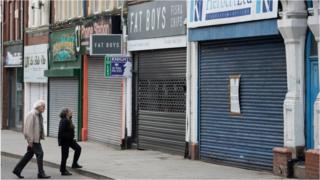Closing furlough scheme ‘a mistake’
 .
.
.
Closing the government scheme which is paying furloughed workers’ wages is a “mistake”, an economic research group has said.
The latest furlough figures show 9.5 million people are using the scheme, the same as a week ago, and at a total cost of £31.7bn to the Treasury.
But those figures are likely to drop quickly, says the National Institute of Economic and Social Research (NIESR).
It could mean millions more people becoming unemployed.
“The planned closure of the furlough seems to be a mistake, motivated by an understandable desire to limit spending,” said Garry Young, NIESR deputy director.
“The scheme was intended by the chancellor to be a bridge through the crisis and there is a risk that it is coming to an end prematurely.
“The scheme has been an undeniable success in terms of keeping furloughed employees attached to their jobs.”
The UK’s coronavirus furlough scheme will finish at the end of October.
- What happens when the furlough scheme ends?
- What jobs are available post-lockdown?
From August, employers must pay National Insurance and pension contributions, then 10% of pay from September, rising to 20% in October.
‘Very uncertain’
Workers are having 80% of their salaries paid for by the government – up to £2,500 a month – under the scheme, which was originally intended to last until the end of July.
NIESR’s research suggested that UK economy could shrink by 10% this year and is unlikely to recover until the end of 2023.
That is a more pessimistic outlook than the think tank’s last forecast in April, which suggested a 7% drop in economic output.
However, the outlook is “very uncertain” and these forecasts are a “plausible outcome” rather than a confident prediction, said Mr Young.
“Unemployment is going to rise to about 10% by the end of this year, before dropping back next year, and we think that an extension of the furlough scheme would have been a relatively inexpensive way to limit that rise in unemployment,” he said.
He estimates that if the furlough scheme had been kept open, there would have been only 1.25 million using it by the end of the year, “hence it would be a bit cheaper to keep it going”.
‘Tricky period’
“The economy is entering a new phase now as it’s opened up but people are not confident yet of social consumption,” affecting hospitality, Mr Young said. “It’s a tricky period.”
Debt could reach 105% of the size of the economy, he said. But with low interest rates, this is more manageable, he said.
“A lot of the government borrowing is being financed by borrowing in this country. People are saving more because they can’t spend and indirectly that’s financing the government spending.”
Savings in bank accounts mean banks are able to deposit more at the Bank of England, which can then buy government bonds, financing government schemes such as furlough, he said.
Of the debt, “you will have to deal with it at some stage,” he said.
A review of taxation may be needed to see how the debt can eventually be reduced, NIESR thinks.




.jpeg?width=682&height=455&name=AdobeStock_295048993%20(1).jpeg)

